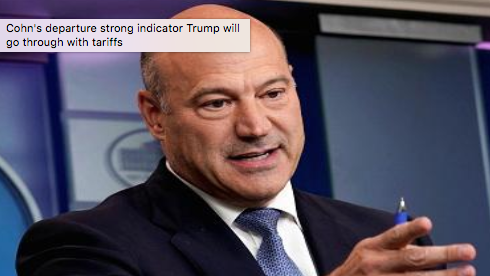
The usual media spin is being applied to the announcement of Gary Cohn’s pending departure from his post as President Trump’s economic adviser. It just has to be a disaster, an indicator of “chaos” in the White House and evidence that all right-thinking people agree that the newly announced proposed tariffs in steel and aluminum import are a bad, bad, bad idea. The frosting on the cake is that Cohn had previously criticized President Trump’s initial remarks following the Charlottesville demonstrations that ended in a fatality. As CNBC delicately put it, the remarks “also fueled the possibility of Cohn, who is Jewish, resigning.” (Pure speculation!)
CNBC’s take.
Here are some factors mostly ignored by the media to consider:
- Cohn has already accomplished his major task: passage of the tax reform bill that is spurring the economy to what should be called “The Trump Boom.”
- One major item missing from the tax reform bill was President Trump’s commitment to eliminate the gigantic tax break for Wall Street called the “carried interest” provision, which allows individuals to pay capital gains taxes, not income taxes, on certain kinds of income realized by the hedge fund crowd. Cohn, as the former president of Goldman Sachs, was likely the major reason why this promise was not kept.
- Since CNBC and many others are speculating, let me repeat some gossip I heard: once the new chairman of the Federal Reserve was named, and was not named Gary Cohn, his departure from the White House became certain. After all, he can return to Goldman, or set up his own hedge fund, and make a huge income. Being chairman of the Fed is a sufficiently prestigious and influential position to outweigh that kind of gain, but a mere adviser serving at the pleasure of a president who is not a globalist or free-market devotee pales, especially now that he gets credit for the tax reform.
- President Trump actually likes turnover and is comfortable with uncertainty and disagreement among his closest staff, aka “chaos.” Remember that his life experience is mostly in real estate development, and construction, which is project-based. That means that when a project is completed, many people depart. And when a new project begins, new staff is recruited. He may well consider the tax reform bill a project. The next economic project – tariffs to protect endangered industries, or maybe elimination of the carried interest provision – requires a somewhat different mix of talent.
